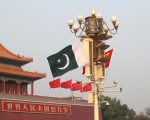International Monetary Fund (IMF) staff recently concluded its visit to Pakistan and summarized its visit in the following statements.

In the Current Account Deficit article, we estimated that Pakistan would need about USD 12 billion to shore up its foreign reserves, and get a breather in making import, and other debt related payments. Although, the incumbent government took its own sweet time in being explicit about whether it will go ahead with borrowing from IMF, but the writing has been on the wall for months now.
Technical gibberish aside, here is a summary of how it will affect a common man:
Depreciation of PKR
It is estimated that PKR is overvalued by around 15 percent. As emerging market currencies across the board depreciate against the USD, it is only a matter of time before PKR takes another plunge, and settle in the range of 140 against the USD. As PKR loses its value, imports become more expensive. Pakistan imports everything from crude oil, and gasoline, to pulses, tomatoes, and even diapers. A hike in prices across the board cannot be ruled out.
Increase in Energy Prices
Recent increase in gas prices will start affecting consumers in the months to come, particularly during winter. Another round of increase in gas and electricity prices may also be on the cards, given an escalation in oil prices globally. Any delay in passing on the impact may further exacerbate the circular debt situation.
An increase in electricity and gas prices will not only result in higher monthly bills for households, but also increase input cost for various manufacturing, and service industries – thereby triggering spiralling inflation. Similarly, a further hike in petrol and CNG prices to the tune of 15-20% may also be on the cards, denting heavily household budgets. A double whammy in the form of higher energy prices and depreciation of PKR is a recipe for double-digit inflation, with effects to be felt across all households, and business segments.
As PKR depreciates and oil prices increase, the price of oil in PKR terms is reaching its 10-year high.
Increase in Interest Rate
As expectations of price increases gain traction, a tool that is often used to control inflation is a contractionary monetary policy. Interest rates have already been increased by 2.75 percent during the last 12 months.
Increase in interest rates by another 2 percent can be expected during the next 12 months. If you have borrowed funds to buy a car, or a house – your monthly installments are going to jump as your base rate resets.
Similarly, the cost of funding for businesses will also increase – with some highly indebted businesses being pushed towards bankruptcy. As second-round effects of a contractionary monetary policy and higher energy costs become clear, the emergence of bad loans is a real possibility. On the flipside, savings rate would increase, particularly benefiting pensioners, and others who save through National Savings Schemes.

As Pakistan enters the IMF program, adjustment of PKR, Energy Prices, and Interest Rates would be quick fixes, which will be on top of the agenda. An increase in direct costs for households and the cost of inputs for businesses will feed into a spiral of inflation, which may require a few years to tame.
As consumption and investment contracts, overall economic growth will suffer as well. The incumbent government will have to take unpopular decisions to take tough decisions while ensuring that the most vulnerable economic segments remain sheltered. Structural reforms pertaining to the widening of tax net, and reformation of Public Sector Entities are critical, yet unpopular tasks, which one hopes that the incumbent government is ready to address.














